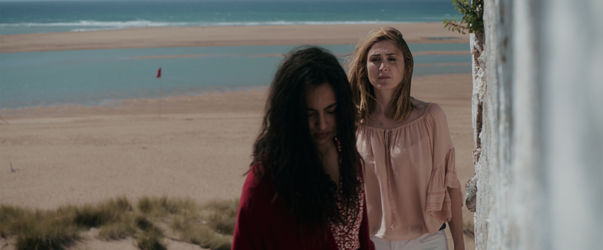Uprooted, Fenced-in
By Yasmine Zohdi

© La Prod, Apatride
Narjis Nejjar’s APATRIDE (Bela Mawten, Morocco), which premiered in the Forum selection of this year’s Berlinale, is an evocative, visually stunning portrait of longing and displacement that takes place on the border between Morocco and Algeria.
The protagonist, Hénia (El Ghalia Ben Zaouia), is a young Moroccan woman obsessed with returning to Algeria, where she and her father left her mother years ago after the Algerian government deported them across the border as a result of the two states’ dispute over the Western Sahara. Her father died shortly after their expulsion, and her papers disappeared with him. In an attempt to remedy the problem, Hénia marries a much older man, but her lustful connection with his son complicates the situation.
Contemplative shots of Moroccan and Algerian flags flapping on sand dunes separated only by a narrow strait of water act as a poetic device punctuating the film, establishing a strong sense of place. Such stylistic visuals are an organic part of the drama, developing an essential spatial relationship between Hénia and the landscape she inhabits, as it presents the very core of her conflict.
Scripted by Nejjar herself, APATRIDE is an impressionistic work that relies on weaving a specific sensory experience to get its statement across. Yet it is also rich on the narrative front, with layers of history and tension to explore between its characters. As the film progresses, bits and pieces of information are gradually revealed with often rewarding effects, even when it comes to small details like the story behind the potted plants Hénia tends to everyday. There is potential that remains unfulfilled, however, mostly due to the awkward acting and unjustifiably sparse dialogue.
Despite its flaws, APATRIDE is an engaging film, one that skilfully avoids the trap into which many filmmakers with strong political messages often fall: that of being too direct, and – subsequently, inevitably – reductive. Instead, Nejjar remains loyal to the particular story of her character, creating a memorable meditation on roots (figurative and literal), and the near impossibility of replanting them once they have been snatched from the ground.

